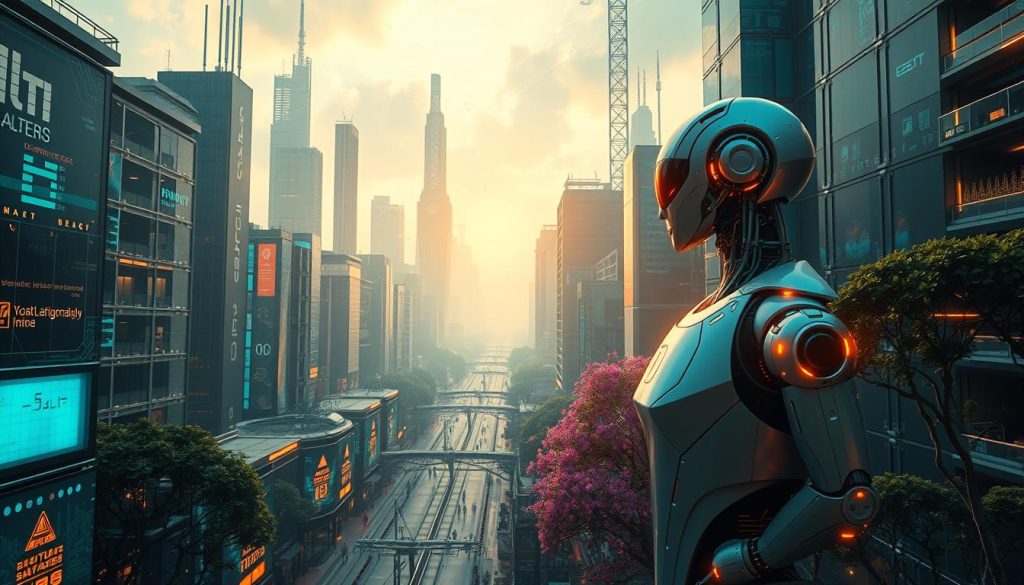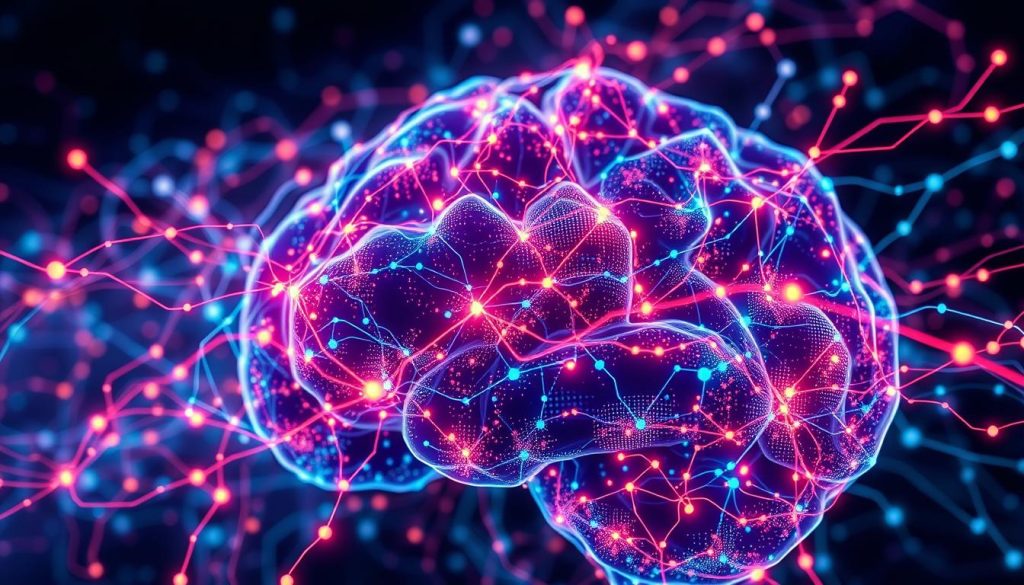Imagine a world where technology knows what you need before you ask. It can understand complex data and solve problems quickly. This is what artificial intelligence (AI) promises. It’s exciting and changing how we see technology.
AI lets machines think like humans. They can learn, reason, and change like us. This means we have virtual helpers and smart systems that change industries. AI is making new things possible.

A futuristic cityscape with sleek digital interfaces and luminous circuits intertwined with nature, showcasing humanoid robots and AI-driven machines harmoniously interacting with the environment, glowing network connections in the air, reflecting the essence of artificial intelligence at work.
We’ll explore AI in detail. We’ll look at where it came from, its main technologies, and how it’s changing our world. Join us to learn about AI’s power and how it can make our future better.
Key Takeaways
- Discover the definition and evolution of artificial intelligence (AI)
- Explore the core technologies that power AI, including machine learning and deep learning
- Understand the diverse capabilities and applications of AI across various industries
- Learn how AI works and the underlying principles that drive its remarkable performance
- Gain insights into the societal impact of AI and its potential to reshape our world
Understanding the Basics of Artificial Intelligence
Artificial intelligence (AI) is a field that’s growing fast. It lets computers do things that people usually do, like seeing and talking. This tech could change many areas of life and work.
Defining Artificial Intelligence
AI includes many techs, like learning machines and talking computers. AI lets computers learn and do tasks on their own. This means they can get better with time, making them very useful.
The Origins and Evolution of AI
The start of AI goes back to the 1950s. Back then, people wanted to make machines that could think like us. Since then, AI has grown a lot, thanks to new ideas like artificial neural networks and deep learning.
Now, AI helps in many fields, like health and money. AI developers are always finding new uses for AI. As AI keeps getting better, it will change our lives even more.
Artificial Intelligence Capabilities and Applications
Artificial intelligence (AI) is changing the world fast. It’s making new things possible in many areas. AI uses things like natural language processing (NLP) and computer vision to help solve big problems.
AI can understand and talk like humans. This is thanks to NLP. It helps virtual assistants like Siri and Alexa work well. They can answer questions and follow commands.
AI can also see and understand pictures and videos. This is called computer vision. It’s used in things like facial recognition and self-driving cars.
AI is great at making decisions and solving problems. It uses machine learning and deep learning to do this. These skills are changing finance, healthcare, and more.
In business, AI helps with tasks that need to be done over and over. It also makes customer service better and helps with data analysis. Enterprise AI helps companies work smarter and stay ahead.
“Artificial intelligence is the future, not the past.”
– Jerry Kaplan, Computer Scientist and Entrepreneur
AI is getting better and will change many areas soon. It will help in healthcare, education, and more. AI is shaping our future in big ways.
How Does Artificial Intelligence Work?
Artificial intelligence (AI) works by copying how our brains learn and make choices. It uses machine learning and deep learning to do this. These methods help AI systems solve problems like our brains do.
Machine Learning and Deep Learning
Machine learning helps AI systems learn without being told how. Deep learning is a step up, using artificial neural networks to think like us.
| Technique | Description | Applications |
|---|---|---|
| Machine Learning | Algorithms that enable computers to learn and improve from experience without being explicitly programmed. | Predictive analyticsSpam detectionRecommendation systems |
| Deep Learning | A more advanced form of machine learning that uses artificial neural networks to learn and make decisions in a way that mimics the human brain. | Image recognitionNatural language processingSpeech recognition |
Artificial Neural Networks
Artificial neural networks are key to deep learning. They look like our brain’s structure. These networks learn from lots of data, getting better at solving problems.

A visually intricate representation of artificial neural networks, featuring interconnected nodes and pathways in a dynamic, abstract style. Highlight vibrant colors and glowing lines to symbolize data flow, with layers that suggest depth and complexity, resembling a futuristic digital brain with swirling patterns and electric energy.
“The human brain is the most complex and powerful known computational device. Artificial neural networks are an attempt to emulate its structure and function in order to solve complex problems.”
The Impact of Artificial Intelligence on Society
Artificial intelligence (AI) is changing our lives in many ways. It’s making big impacts in healthcare and education. As AI gets better, its effects on society are growing stronger.
AI in Healthcare
In healthcare, AI is leading to big changes. Virtual assistants give personalized health tips. Natural language processing (NLP) and machine learning help doctors make better diagnoses.
AI can spot diseases early, like cancer, by looking at scans. This is very accurate.
AI is also changing how we get healthcare. It makes care better and makes things run smoother. AI can listen to doctor-patient talks and help doctors focus on care.
AI can also help plan how to use resources better. This makes healthcare smarter and more efficient.
AI in Education
AI is making a big difference in education too. AI-enabled personalized learning gives each student what they need. AI-powered virtual tutors help students one-on-one.
AI can also help teachers grade work faster. This lets teachers spend more time with students. AI-driven educational analytics give teachers insights to improve teaching.
As AI gets better, its effects on society will grow. But we must think about the challenges too. Like jobs lost, privacy issues, and making sure AI is used right.

A futuristic healthcare facility with advanced AI technology, featuring robotic assistants interacting with medical professionals and patients, alongside a modern classroom environment where AI-driven educational tools are enhancing learning, with digital interfaces displaying data and engaging interactive experiences.
Conclusion
In this article, we explored the world of (AI). We learned about its core, key technologies, and its big impact on many fields. AI lets computers do things like humans, from understanding language to seeing and hearing.
The story of AI started in the 1950s. Since then, it has grown a lot. This is thanks to better computers, more data, and smart artificial neural networks. Now, AI changes how we solve problems, make choices, and even create.
Looking ahead, AI will change our world even more. AI experts are always finding new ways to use it. They’re working on things like understanding language better and seeing the world around us.
As AI becomes part of our lives and work, it makes things better. It helps us do things faster and smarter. But we must use AI wisely. We need to make sure it helps everyone, not just a few.
FAQ
What is artificial intelligence (AI)?
Artificial intelligence (AI) lets computers do things we humans do. Like seeing, hearing, and making choices. It’s like having a super smart computer.
How does AI work?
AI uses special computer programs to learn from data. It finds patterns and makes choices. These programs are like tiny brains inside computers.
What are the capabilities of AI?
AI can do lots of things. Like understand words, see pictures, and make decisions. It helps with things like virtual helpers and finding new medicines.
How is AI being used in different industries?
AI helps in many fields. In healthcare, it finds diseases and plans treatments. In finance, it spots fraud and helps with trading.
What are the potential societal impacts of AI?
AI could change our world in big ways. It might make things better by being more efficient. But, it could also take jobs and raise privacy concerns.
How can AI be developed and deployed responsibly?
Making AI safe and fair needs teamwork. We need rules, clear plans, and to think about how it affects everyone. This includes keeping data safe and avoiding unfair choices.

